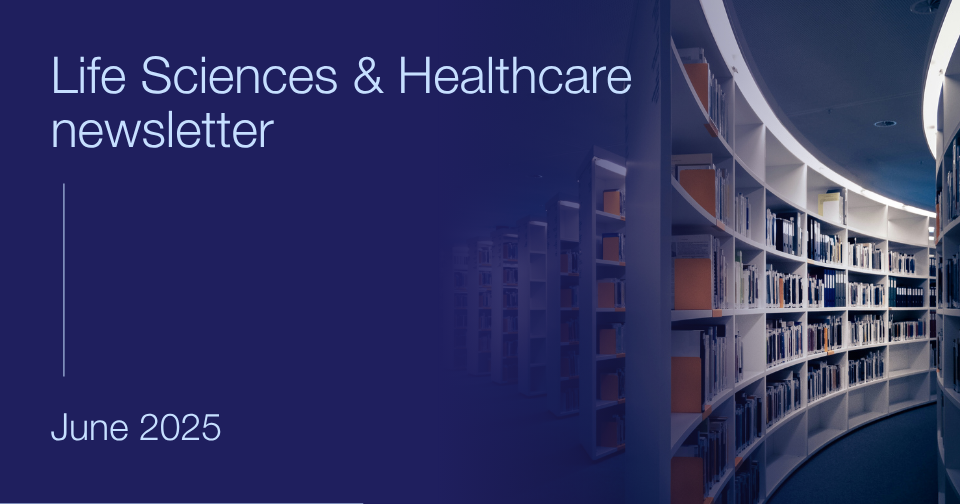
In this newsletter, we discuss legal news which broadly impacts the life sciences and healthcare sector, as well as updates specifically relevant to research and development. This time we are covering:
- At the EU level, the Council is now ready to begin negotiations with the European Parliament about the “pharma package”, and a regulation is under discussion that in a crisis or emergency would empower the Commission to grant a compulsory license for patents, published patent applications, utility models, and supplementary protection certificates.
- Estonia plans to streamline and clarify the conduct of scientific research, including the usage of personal data. The Estonian government’s new coalition agreement includes plans to accelerate the introduction, testing and development of medicines, health technology and AI.
- On 28 May 2025, the conference “Latvia – Europe’s Pharmaceutical Innovation HUB” was held in Latvia. It was organised by the Latvian Association of Pharmaceutical Manufacturers in cooperation with pharmaceutical manufacturers.
- The State Medicines Control Agency of Lithuania (the Agency) has published draft methodological guidelines for the Health Technology Assessment (intended for medicinal products). According to the Agency, the main goal of these guidelines is to accelerate the Health Technology Assessment in Lithuania.
Compulsory licensing for life sciences and healthcare products
On 21 May 2025, the European Parliament and EU government negotiators reached an agreement on a new regulation concerning compulsory licensing of patents, including published patent applications, utility models, and supplementary protection certificates. The regulation allows the Commission to grant a compulsory licence without the authorisation of the rights-holder if a crisis or emergency has been activated or declared. The rights-holder and the licensee may reach a voluntary agreement instead of a compulsory licence. The compulsory licence would be defined in scope, territorial coverage and duration. The regulation establishes obligations on the part of the licensees, including the obligation to pay appropriate remuneration to the rights-holder. The total remuneration will be determined by the Commission. The regulation does not require the disclosure of trade secrets.
The regulation has not been adopted yet. It has to be formally approved by the European Parliament and the European Council.
Estonia plans to change laws regarding scientific research
In Estonia, the conduct of scientific research in the field of life sciences and healthcare – including usage of personal data – will be impacted by the draft Organisation of Research and Development Act and by proposed amendments to the Personal Data Protection Act.
Section 6 of the Personal Data Protection Act sets out requirements for the processing of personal data for scientific research, particularly in situations where data is to be processed without the consent of the data subject. Despite the importance of the provision, implementation has been difficult, especially when processing special categories of data (including health data) and/or personal data from multiple data sources. Currently, there are plans to:
- clarify the conditions and safeguards for processing personal data in scientific research. The intention is to distinguish between the conditions applicable to research using pseudonymised data, data allowing equivalent data protection, and data allowing the identification of individuals.
- stipulate that the processing of personal data related to the development of artificial intelligence is a technological development and, as such, scientific research
- create a legal basis for the state to combine data from different databases and to render the data unidentifiable before transferring it to the researcher
- subject the assessment of ethical and data protection aspects to the ethics committee to be established by the draft Organisation of Research and Development Act.
The draft Organisation of Research and Development Act entails the following changes to scientific research:
- establishment of a scientific ethics committee.
- subjecting the establishment of and tasks carried out by research and development institutions’ internal ethics committees to the requirements of an implementing act. Even if the institution has established an internal ethics committee, the institution may still refer ethical assessment(s) to the scientific ethics committee.
- establishment of a commission for the investigation of cases of misconduct in scientific ethics to ensure that research and development activities comply with scientific ethics standards and good scientific practice. Although the research and development institution itself remains the primary body responsible for investigating suspected violations, institutions and parties involved in suspected violations may request an additional assessment of the case from the commission.
Estonia’s new coalition agreement to accelerate the life sciences and healthcare sector
On 24 May 2025, the Estonian government reached a coalition agreement, which guides national policy and shapes legislative activity in Estonia. According to the coalition agreement, the government plans, inter alia, to:
- accelerate the introduction and testing of new evidence-based medicines, health technologies, methods and models by amending the legal landscape
- develop the principles of the application of artificial intelligence in healthcare to ensure the safe and effective use of innovative technologies for the benefit of the patient and to increase the quality of health care services
- make the updating of data in the Estonian Biobank automatic and the release of data from it more transparent
- amend the financing of ultra-orphan medicines.
Currently, the deadline for these actions is set for the first or sector quarter of 2026.
Latvian Pharmaceutical Manufacturers Association presented Latvian Pharmaceutical Strategy at a conference on pharmaceutical innovation
On 28 May 2025, the conference “Latvia – Europe’s Pharmaceutical Innovation HUB” was held in Latvia. It was organised by the Latvian Association of Pharmaceutical Manufacturers in cooperation with Olpfa, Grindex and PharmIdea.
Among other topics, Raina Dūreja-Dombrovska, executive director of the Latvian Pharmaceutical Manufacturers Association (LZRA), presented the Latvian Pharmaceutical Strategy 2025–2035, which aims to increase the sector’s turnover from EUR 400 million to EUR 1.5 billion in just over five years. The strategy’s guiding principle is “100 innovative, hard-to-replicate products in 100 global markets.”
Key priorities include: expanding export capacity, boosting efficiency through new technologies, and driving innovation. Strategic development areas include value-added generics, improved manufacturing technologies, and original products.
The implementation plan is divided into three phases:
- short-term (1–2 years): establish cooperation platforms between manufacturers, research, and educational institutions; map industry competencies; and plan funding programmes.
- medium-term (3–5 years): modernise and expand scientific and production infrastructure, secure funding for strategic projects, develop new products, enter new markets, and strengthen international partnerships.
- long-term (5+ years): reach EUR 1.5 billion in turnover, achieve exponential industry growth, enhance global competitiveness, diversify into new niches, and invest in emerging technologies and the startup ecosystem.
Dūreja-Dombrovska emphasised that the pharmaceutical sector must lead in production, science and education, while the state’s role includes:
- providing a supportive regulatory and business environment
- ensuring access to financial tools
- promoting scientific capacity, the transfer of innovations between the state and the industry, and the concentration of competencies and infrastructure
- developing human capital through strategic education policies and modern learning infrastructure
The LZRA developed the ten-year strategy in cooperation with manufacturers AS Olpha, AS Grindeks, SIA Pharmidea, the University of Latvia, Riga Technical University, Riga Stradiņš University and the Latvian Institute of Organic Synthesis.
New draft guidelines for Health Technology Assessment in Lithuania
To optimise the Health Technology Assessment (HTA) process and accelerate the evaluation of health technologies in Lithuania, draft methodological guidelines for the assessment of health technologies related to medicinal products have been prepared by the State Medicines Control Agency of Lithuania (the Agency). According to the Agency, it is expected that this methodological material will be useful for all stakeholders involved in the HTA process, including assessment specialists, medicinal product marketing authorisation holders or their representatives, professional medical societies, and patient organisations.
The plan is for the methodological guidelines prepared to be presented at an event to be held in June.
#sorainenlifesciences: our practice in action
- Our partner Lise-Lotte Lääne, head of the Life Sciences and Healthcare sector group, advised Livonia Partners, a Baltic private equity fund, on the acquisition of a majority stake in Medicum, one of Estonia’s largest healthcare companies. More information can be found here.
- The International Bar Association has published an article titled “Patient Access Programmes/Patient Assistance Programmes: Legal Benefits and Challenges for Patients”, authored by Dovydas Gudžiūnas, senior associate and head of the Life Sciences Sector Group in Lithuania. The article discusses the concept and the main legal challenges for patient support programmes across the globe. It is available here.
- Lise-Lotte Lääne gave a lecture to health tech entrepreneurs on the use of artificial intelligence in the medical technology. The recording (in Estonian) can be viewed here.
- From 11 to 13 June, Dovydas Gudžiūnas was representing Sorainen at the 11th Annual International Bar Association World Life Sciences Conference in Boston, USA.
Our international Life Sciences & Healthcare team is at your disposal, should you need advice on any legal issues you are facing.
Subscribe here if you would like to receive newsletters and invitations to webinars and offline events.
Contact our experts:

Regional co-head of Life Sciences & Healthcare sector group, Estonia

Senior Associate, Latvia

Senior Associate, Lithuania
dovydas.gudziunas@sorainen.com


